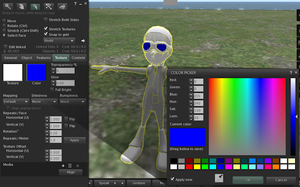Mesh/Uploading a multi-face mesh: Difference between revisions
Bea Linden (talk | contribs) No edit summary |
Bea Linden (talk | contribs) No edit summary |
||
| Line 23: | Line 23: | ||
#: Two new assets appear in your inventory: one in your '''Meshes''' folder, the other in your '''Objects''' folder. | #: Two new assets appear in your inventory: one in your '''Meshes''' folder, the other in your '''Objects''' folder. | ||
#: For the seymour object, these new assets are named '''boyShape'''. | #: For the seymour object, these new assets are named '''boyShape'''. | ||
#: Note: In this | #: Note: In this tutorial, we only care about the asset in your '''Object''' folder. | ||
{{Warning|While the Seymour asset does contain a rig, it is incompatible with the current Mesh Project Viewer code. If you enable '''Skin Weight''', Seymour's skin will be generated incorrectly. You'll see the incorrect behavior in the tool preview window, and if uploaded, you'll see a group of large flickering triangles inworld.}} | {{Warning|While the Seymour asset does contain a rig, it is incompatible with the current Mesh Project Viewer code. If you enable '''Skin Weight''', Seymour's skin will be generated incorrectly. You'll see the incorrect behavior in the tool preview window, and if uploaded, you'll see a group of large flickering triangles inworld.}} | ||
Revision as of 16:04, 14 December 2010
Just as we can texture individual faces of a primitive differently, we can texture individual faces of meshes differently if the mesh has been properly set up for materials before import.
Get a Second Life compatible mesh file
The first step is to get a multi-material mesh file that you want to upload to Second Life. Second Life's mesh import is able to read COLLADA (".dae") files.
- Click this link -- https://collada.org/owl/download.php?sess=0&parent=131&expand=1&order=name&curview=0&binary=1&id=707 -- to download the "seymour.dae" COLLADA file.
- Save the file anywhere on your hard drive where you can find it later.
Upload the mesh file to Second Life

Upload the mesh file from your computer to Second Life:
- Select Build > Upload > Model from the menu at the top of the Second Life Viewer.
- Alternatively, open My Inventory, click the + button, and select Upload > Model.
- A file upload window opens.
- Find and select the
seymour.daefile from your computer.- The Upload Model window appears.
- Enter a name for your model in the Name field.
- Click the Upload button.
- Two new assets appear in your inventory: one in your Meshes folder, the other in your Objects folder.
- For the seymour object, these new assets are named boyShape.
- Note: In this tutorial, we only care about the asset in your Object folder.
While the Seymour asset does contain a rig, it is incompatible with the current Mesh Project Viewer code. If you enable Skin Weight, Seymour's skin will be generated incorrectly. You'll see the incorrect behavior in the tool preview window, and if uploaded, you'll see a group of large flickering triangles inworld.
Add your mesh object to the world and edit it

You can now manipulate your mesh as if it were any other object in your inventory:
- Find your boyShape object in your Objects folder; if you're having trouble or have a large inventory, use your inventory's RECENT tab.
- Drag the new object from your Objects folder to anywhere on the ground where you have permissions to build.
- The model appears on the ground.
- Right-click the model and select Edit.
- The Edit Object window appears.
- Click the Select Face radio button.
- Left-click the goggle lenses of the model.
- Click the color swatch in the Texture tab and change the color, or click the texture swatch and change the texture.
- Add color and/or textures to other parts of the model (gloves, goggle frame, face, or cap) in the same way.
Continue on to Uploading and wearing a rigged mesh.
